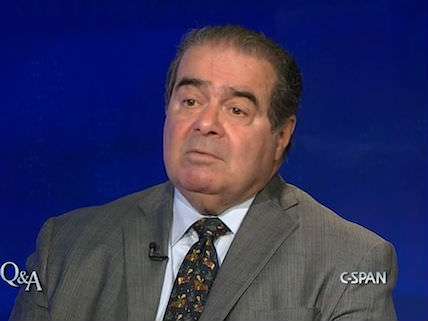Liberal Pundit Fears 'Libertarian' Fallout from Pro-Gay Marriage Ruling by SCOTUS
The same individualistic jurisprudence that advances gay rights could also imperil "progressive" economic reforms.
Last week the U.S. Supreme Court heard oral arguments in the gay marriage case Obergefell v. Hodges. At issue is whether state laws which prohibit same-sex unions violate the 14th Amendment, which forbids state governments from denying the equal protection of the laws to any person within their respective jurisdictions.
Standing before the Court, John Bursch, special assistant attorney general for the state of Michigan, argued that "this case isn't about how to define marriage. It's about who gets to decide that question. Is it the people acting through the democratic process, or is it the Federal courts?" In Bursch's view, such regulatory decisions should be left in the hands of democratically accountable state lawmakers. The federal courts should butt out.
Mary Bonauto, the lawyer challenging those state bans on behalf of several gay couples, framed the case quite differently. "In terms of the question of who decides," she told the justices, "it's not about the Court versus the States. It's about the individual making the choice to marry and with whom to marry, or the government."
Judging by the outpouring of punditry, most liberals appear to agree with Bonauto. But there is at least one notable exception to that seeming liberal consensus. Writing at The Atlantic, the liberal legal analyst Jeffrey Rosen worries that the American left could suffer a Pyrrhic victory if gay marriage prevails in Obergefell. Why? Because "the right to dignity—now celebrated by liberals for what it means to gay rights—could ultimately produce other decisions in unrelated cases that they would not be so quick to celebrate." For example, Rosen notes, "in the McDonald case, striking down gun possession laws under the Second Amendment," legal conservatives "recognized a dignitary interest attached to the right to bear arms." Similarly, Rosen says, "libertarian groups" argued "that the Obamacare healthcare mandate unconstitutionally violated the dignity and autonomy of Americans by forcing them to buy health insurance." In short, Rosen fears, if the Supreme Court places individual dignity and autonomy above government power in this case, "progressive legislation" could be similarly imperiled in future cases. Perhaps, Rosen implies, the fate of gay marriage is better left to the democratic process after all.

Ironically, conservative Justice Antonin Scalia employed a very similar argument back in 2003 when he dissented from the Supreme Court's landmark gay rights ruling in Lawrence v. Texas, in which the Court struck down that state's ban on gay sex. According to Scalia, Texas' Homosexual Conduct Law "undoubtedly imposes constraints on liberty." But so do state laws which prohibit "working more than 60 hours a week in a bakery." In both instances, Scalia said, democratically accountable lawmakers should have the final say on whether or not the regulation gets to remain on the books. The federal courts should butt out.
Scalia's reference to bakeries in Lawrence was a subtle nod to the Supreme Court's 1905 decision in Lochner v. New York, the famous Progressive era case in which the justices invalidated the maximum working hours provision of that state's Bakeshop Act on the grounds that it violated the individual liberty secured by the 14th Amendment. If you ask most modern legal liberals, they'll tell you that Lochner was wrongly decided and in fact symbolizes the dangers of libertarian judicial activism. Scalia agrees. By invoking Lochner in a gay rights case, Scalia was trying to get his liberal colleagues to connect the dots and realize that government regulatory power is undermined whenever a federal judge invalidates a state law based on a libertarian reading of the 14th Amendment.
Rosen connected the dots. "If the Court strikes down same-sex marriage bans on the grounds that they violate a right to dignity," he writes about last week's Obergefell oral arguments, "liberals may have second thoughts about empowering judges to decide whose dignity trumps when the interests of citizens with very different conceptions of dignity clash."
In other words, according to both Scalia and Rosen, strict judicial enforcement of the 14th Amendment could serve the twin ends of advancing gay rights and imperiling certain "progressive" economic regulations. Let's hope they're right.


Show Comments (159)